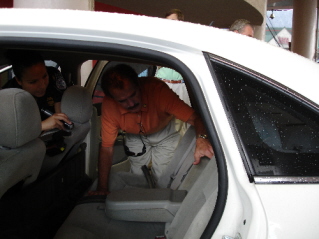A former State Department official who fought the Afghan drug war has taken to the New York Times to tell why the failure of the program is everybody else's fault not his.
With South Dakota's annual Sturgis Motorcyle Rally just a few days away, state law enforcement is gearing up for unwary travelers. Eric Sage was one of their victims last year. He's not going this year, but he just filed a civil suit over his mistreatment.
Rep. Mark Souder (R-IN) has made a political career out of being "tough on drugs." Now, in an election year where Obamamania has already swept his district, a newly-formed political action committee wants to make him pay for it.
Apply for an internship at DRCNet for this fall (or spring), and you could spend the semester fighting the good fight!
StoptheDrugWar.org's executive director recently did a 25-minute debate on drug legalization on a network that airs across Europe and the Middle East. Video is online here.
Three cases of crooked cops in Florida this week, and a pair of asset forfeiture abuse situations in St, Louis and Muncie, Indiana.
Last year, Hawaiian teachers agreed to a labor contract that included random drug testing. Now, with one eye on costs and the other on the Constitution, they are balking, and the Republican governor is most unhappy.
If a police officer smells marijuana coming from a car, that's not enough evidence to arrest everyone in it, the Washington state Supreme Court has ruled.
Research from Italy suggesting that whole-plant marijuana extracts provide more effective pain relief than isolated compounds from the plant should be welcome news for medical marijuana supporters.
The man who until last month was in charge of US anti-drug efforts in Afghanistan accuses the Karzai government of involvement in the drug trade. He's not too happy with the US military and NATO, either.
The resort to the ultimate sanction for drug offenders continues apace in China and Saudi Arabia.
Health officials in Quebec are planning to open a safe injection site in Montreal, then Quebec City, and maybe more.
South Australia has now criminalized the possession of high intensity lights, reflectors, and anything else that might be used to grow marijuana. You now have to prove you weren't going to grow pot to avoid prosecution instead of the state having to prove you were.
Events and quotes of note from this week's drug policy events of years past.
"Needle Exchange Saves Lives. Why Are We Still Arguing About It?," "A Revealing Remark From the Deputy Drug Czar," "The Drug War Doesn't Reduce Drug Use. Drug Users Reduce Drug Use.," "In New Orleans, You Can Get 5 Years in Prison for a Joint of Marijuana," "Police Kill Dog During Drug Raid, Find No Drugs," "Barack Obama Proposes 'Shifting the Model' on the Drug War," "Video Highlights from Vienna Drug Policy NGO Forum," "Drug Smugglers Use Hurricane for Cover."
Drug War Chronicle is seeking information on serious police misconduct or misjudgments in the treatment of informants. Confidentiality will be protected.
Do you read Drug War Chronicle? If so, we need your feedback to evaluate our work and make the case for Drug War Chronicle to funders. We need donations too.
Support the cause by featuring automatically-updating Drug War Chronicle and other DRCNet content links on your web site!
A new way for you to receive DRCNet articles -- Drug War Chronicle and more -- is now available.
Visit our new web site each day to see a running countdown to the events coming up the soonest, and more.
David Borden, Executive Director

David Borden
There's an article appearing in the upcoming New York Times Magazine this weekend, pre-released online, that would be funny -- if it weren't appearing in one of the world's most influential publications, that is, and if it hadn't been written by someone who until recently had great influence in an area of policy that he so woefully misinterprets. In "
Is Afghanistan A Narco-State?," former Principal Deputy Assistant Secretary for the Bureau of International Narcotics and Law Enforcement Affairs Thomas Schweich blasts Afghans, Europeans, Democrats, the media -- even the Pentagon -- for "preventing the implementation of an effective counterdrug program."
As Jacob Sullum points out in Reason, the answer to the question of whether Afghanistan is a narco-state is "yes." But what Schweich doesn't ask is, why does opium have this power to corrupt governments, empower extremists, warp the economy of an entire nation? After all, there is plenty of legal opium growing around the world, for medical uses, that doesn't have this effect. The answer is: Afghanistan's opium crop is illegal. But because lots of people still want opium and its derivative products like heroin, for their illegal uses, and are willing to pay lots of money for them, there are others who are willing to take the risk that engaging in illegal activity entails, in order to earn the heightened profit that the illegality and risk makes available. In other words, it is drug prohibition that has turned Afghanistan into a narco-state.
Schweich points out that there are places where the opium crop got pushed out before -- Guatemala, nearby Southeast Asia, Pakistan -- and that's what he wants to see in Afghanistan. But another obvious question that he fails to ask is, did this actually reduce the supply of opium and opiates? Or did it simply move the growing to other countries? (Hint: It moved to Afghanistan -- the country we're talking about -- right next to Pakistan.)
The other obvious question is, why did all those different people -- all those different kinds of people -- fail to support Schweich's agenda? After all, there couldn't be any good reason not to support releasing large quantities of poisonous chemicals into the air (for eradication); or not to try to wipe out an enormous fraction of Afghanistan's economy and the livelihoods of hundreds of thousands of people, at the very time when the Taliban wants to win their loyalty, could there?
Maybe it's because these Afghans and Europeans and US military officials aren't crazy. Maybe it's because they've actually listened to what scholars have to say about this: eradication doesn't work, it drives farmers into the hands of the Taliban, security has to come first, you can't just tell a hundred thousand people in the world's fifth poorest nation to give up their primary income source with no viable replacement. Could they have taken the positions they've taken, made the decisions they've made, because they are intelligent and informed and logical and practical?
To the Schweichs of the world, it's everybody else who's crazy -- or wrong, or corrupted -- anyone but him. And no matter how many times his policies fail to produce the desired result when measured meaningfully, it's okay. Because that's a detail that doesn't merit asking a question about -- certainly not in an article written for the New York Times -- and he's busy fighting drugs. Which obviously we have to continue to do, in the way we have done before -- because -- because we just do. Evidently no matter what, as far as the Schweichs of the world are concerned.
back to top
South Dakota's annual Sturgis Motorcycle Rally begins next weekend and, as usual, is expected to draw huge crowds of motorcycling enthusiasts. Eric Sage won't be one of them. Instead, he will be busy suing a South Dakota county, its prosecutors, and a Highway Patrolman over what happened to him when he went last year.
In addition to the hordes of bikers, the rally also attracts the attention of South Dakota law enforcement, with the state pulling large numbers of Highway Patrol troopers from East River to the Black Hills, where they lurk on the sides of highways like vultures waiting for their prey. And, if Highway Patrol statistics are any indication, the hunting is good.

Main Street during Sturgis Rally (courtesy Wikimedia)
Most weeks, state troopers make
a handful of felony drug arrests and three or four dozen misdemeanor ones. Last year during Sturgis week, the Highway Patrol bragged that it had made a whopping 38 felony and 192 misdemeanor drug arrests.
Eric Sage and three of his friends made up four of them. As we reported last year, Sage was driving a motorcycle home from the rally while his three friends convoyed with him in a pick-up truck. Sage was pulled over for "weaving" in his own lane by a state trooper, and the pick-up stopped a ways up the road to wait for him. The trooper, Dan Trautman, then asked for and received permission to search the pick-up, and found a pipe and a miniscule amount of marijuana. He then charged all four with possession of paraphernalia, including Sage, who wasn't even in the vehicle.
Sage refused to plead guilty to a crime he had not committed. Then, just before an October dispositional hearing, Gina Nelson of the Pennington County state's attorney's office left a message on Sage's phone: "If you don't plead to 'paraphernalia', we'll charge you with 'ingestion'" -- an offense unique to South Dakota.
South Dakota Codified Law 22-42-15 prohibits ingesting anything except alcohol for the purpose of intoxication, and they'll put you in jail for as long as a year, and fine you as much as $1,000, for wanting to get "high" instead of drunk. It also doesn't matter if you were even in South Dakota when you ingested the drug: "The venue for a violation of this section exists in either the jurisdiction in which the substance was ingested, inhaled, or otherwise taken into the body or the jurisdiction in which the substance was detected in the body of the accused."
The basis for the ingestion charge was the admission by one of the pick-up passengers that she had smoked marijuana with her friends earlier in the day. As Trautman put it on his dashboard video, "You have all just admitted to smoking marijuana." Of course, that was not the case, but it was the basis for the prosecutorial intimidation effort.
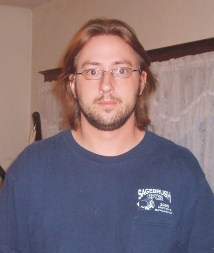
Eric Sage
Sage rejected the intimidating plea offer from Nelson and dutifully drove once more the 500-mile round trip from his Nebraska home to appear in court on the appointed day, only to find that Nelson had dropped the charges without bothering to notify him. Out several thousand dollars in legal fees, travel expenses, and lost wages, Sage wanted justice for his bogus arrest and prosecution.
Assisted by long-time activist Bob Newland, head of South Dakota NORML, whom he had contacted shortly after his arrest, Sage sent letters of complaint to the state Department of Public Safety, the South Dakota Bar Association, and the Pennington County Commission. In the latter letter, he also demanded damages.
Not surprisingly, he struck out with state and local authorities. Neither the county commission nor the Highway Patrol would pay his expenses incurred, nor would they even apologize for the mistreatment.
"The county commission gave the first complaint I sent them to the state's attorney's office and -- go figure! -- they lost it," Sage recounted this week. "When I sent a copy to all five commissioners, all I got was a letter from the state's attorney saying he would not respond. The Highway Patrol gave me the finger, basically saying that if I couldn't accept a frivolous charge every now and then, I should stay off their highways."
Sage had slightly better luck with the bar association. After claim and counter-claim by Sage and prosecutor Nelson, the bar found that Nelson had indeed violated two bar association precepts, the duty not to file unfounded charges and the duty not to unduly burden innocent parties. The bar punished Nelson for her prosecutorial misdeeds by "admonishing" her not to do it again.
That wasn't enough for Sage. On Tuesday, he filed a lawsuit against Pennington County, Pennington County Deputy State's Attorney Nelson, her boss, State's Attorney Glenn Brenner, and Highway Patrolman Trautman. The lawsuit seeks damages of slightly over $4,000 to compensate Sage for his malicious arrest and subsequent malicious prosecution.
The prosecutor's office did not respond to a call for comment.
"They wasted my time and my money for something they didn't have the least bit of evidence to prove even took place," Sage said. "If I don't get my money back, at least I'll get my money's worth."
"What happened to Eric Sage was outrageous," said South Dakota NORML's Newland. "To be honest with you, by this point I'm almost numb to their outrages, but after I heard his story, I thought, wow, this one is strange. They do a lot of bogus busts around here, but usually they at least have a shred of evidence."
Whatever the outcome of his civil suit, Sage is through with South Dakota. "I went to Sturgis three times in the past few years, and it just gets worse every year. If you see a cop, they're pulling someone over. They're just fishing for busts and the money they can make off them," Sage said. "I'm not going there again. I'm not going to South Dakota again. If I need to go to North Dakota, I'll go over to Iowa and Minnesota to get there."
"You don't even have to break the law to get stopped," said Newland. "Highway Patrolmen swarm the area between Sturgis and the Buffalo Chip campground a few miles away. For Sturgis week, that stretch of road is the most dangerous in America -- for getting busted. During peak traffic hours, the Highway Patrol is doing nothing but pulling over vehicles."
As for Sage, he has the following advice for anyone planning to head for Sturgis next week. "Good luck with that. Let me know how it turns out, because I won't be going. Know your rights."
back to top
Rep. Mark Souder (R-IN) has made a political career out of being "tough on drugs." For years, his championing of such harsh legislation as the Higher Education Act's (HEA) drug penalty, his support of foreign drug war adventures in places like Colombia and Mexico, and his relentless opposition to any softening of the marijuana laws, even for medical uses, have served him well with his conservative northeast Indiana constituents -- or at the least, have not prevented him from being reelected.
To be fair, Souder has in recent years shown some small signs of retreat from his drug war dogmatism. While he championed the HEA drug provision, he was willing to water it down to only apply to students busted while in school and receiving financial aid, although that was partially in response to efforts to repeal it outright. And he has been a supporter of the Second Chance Act, which would presumably help some of the people incarcerated under the drug war he champions. Nevertheless, drug reformers still regard Souder as the devil, or at least a ranking demon.
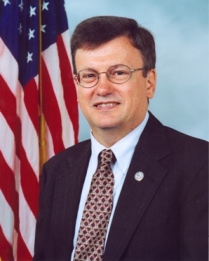
Mark Souder -- #1 drug warrior
But while his seat has been safe so far, this year could be different. Not only is the Republican incumbent running in a year that could well see a rising Democratic tide, not only does he have an energetic and well-financed Democratic challenger in 27-year-old attorney Mike Montagano, but now Souder is facing a new political action committee (PAC) for whom drug warrior number one is target number one.
The PAC is the Schools Not Prisons PAC, headed by Darrell Rogers, a 29-year-old who honed his political skills with stints as a congressional intern, a volunteer for the Jim Webb senatorial campaign, and earlier, as executive director of Students for Sensible Drug Policy (SSDP), a group formed largely in response to Souder's HEA amendment that has helped spearhead the ongoing campaign to kill it dead.
Then Rogers picked up a masters degree in American Government from the Catholic University of America in Washington. Now, he's ready to put all that knowledge and experience to use.
"The PAC actually began as a grad school project when I was doing my masters," he said. "Now, I see a real opportunity for this to grow into something fundamentally sound and sustainable that will be able to have a real impact on selected congressional races."
"Our goals are three-fold," Rogers explained this week from his suburban Washington office. "We want to target and defeat members who have been expanding incarceration while limiting educational opportunities for people with drug offenses. At the same time, we want to support members who are good on our issues of supporting educational opportunity and looking for reasonable alternatives to our policies of over-incarceration," he said.
"But one of our most important goals is to defeat Congress' number one drug warrior, biggest enemy of education and biggest fan of imprisonment," said Rogers, alluding, of course, to none other than Souder. "We want to make having the title of number one drug warrior such a burden for representatives that they will shy away from positions that could earn them that title."
That's something drug reformers have long ached to see. Not only must elected officials understand that they will not pay a price for supporting reform efforts, but the converse must also hold true: Elected officials must understand they will pay a price for supporting punitive prohibitionist policies, the thinking goes.
So far, that has happened on only a tiny number of occasions -- the defeat of hard-line incumbent Albany, New York, prosecutor Paul Clyne by reformist David Soares in 2004, and the defeat of then-drug warrior and Georgia congressman (and now Libertarian Party presidential nominee!) Bob Barr in the Republican primary in 2002 after Libertarians ran a series of TV ads portraying him as indifferent to the suffering of medical marijuana patients.
Mark Souder would make a great addition to that list, said DC-based activists who have gone up against him on Capitol Hill. "Mark Souder is the author and chief proponent of one of the most harmful and misguided drug laws this country has ever seen with the HEA drug provision," said Tom Angell, communications director for SSDP. "It's exciting to see young people fed up with these destructive drug policies fighting back in the political arena."
"Souder is the last of the true drug war extremists," said Bill Piper, national affairs director for the Drug Policy Alliance. Get rid of him and Congress loses its most vocal cheerleader for punitive drug policies. He's in his toughest re-election race yet; it's possible to knock him out."
Souder has fended off attacks from drug reformers before. In 2002, a PAC that included several then-SSDP members went into his district in a bid to knock him off in the Republican primary. It didn't work, as Souder defeated his challenger and went on to win the general election on the rising Republican tide of the early Bush years.
But times have changed. While Souder is busy crusading against needle exchanges, medical marijuana, and any other drug reform effort that he associates with the stench of "legalization," his district is hemorrhaging jobs and his constituents are caught in the same unhappy inflationary spiral as the rest of the country. And the candidacy of Barack Obama, senator from the neighboring state of Illinois, has energized Democratic voters in Indiana's 3rd District, just as it has across the land.
That was evident on primary day. With turnout swelled by the Democratic presidential primary, Montagano pulled in 76,356 votes, nearly double the 40,000 votes Souder garnered in his primary. Montagano's primary vote tally is within shouting distance of the total votes Democratic challenger Thomas Hayhurst got in the 2006 general election and suggests Montagano could pick up even more in November.
In the 2006 election, Souder carried nearly 95,000 votes to Hayworth's nearly 80,000. That gave Souder a victory margin of 54% to 46%. But with the ranks of Democratic voters swelling, that margin of victory is likely to shrink or even be reversed this year.
Montagano is also leading Souder in fundraising. The Fort Wayne Journal Gazette reported this week that, according to the latest Federal Election Commission filings, Montagano had received $142,000 in PAC and individual donations since mid-April, while Souder had raised only $91,000.
Montagano also has more money in the bank. According to a Tuesday report in Roll Call examining the possibility of a Souder defeat, the Democratic challenger has $353,000 banked, compared to the incumbent's $320,000.
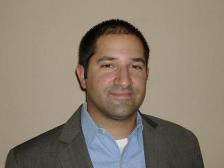
Darrell Rogers
While poll numbers are scarce -- the only direct Souder versus Montagano poll was in mid-May, before Montagano even won the nomination, and showed Souder with a two-to-one lead -- political observers are beginning to suggest Souder may indeed be vulnerable. That same April poll showed Souder's job approval at only 46%. In its most recent listing of competitive House races, the respected
Cook Political Report moved Indiana's 3rd from the "solid Republican" category to "likely Republican." Similarly, the Roll Call story this week noted that the Democratic Congressional Campaign Committee had begun listing Indiana's 3rd as a "race to watch."
For Rogers and the Schools and Prisons PAC, all of this is a call to arms. "The fundraising Montagano's doing, the primary numbers we've seen, and the continuing reports from the race watchers all lead us to a real call for action," said Rogers. "And this is a presidential election year with an incredible amount of new voters. We have to do something with this; it's an opportunity we can't afford to let pass."
And Rogers is getting busy. He's been hitting the phones looking for donations, both in Washington and in the 3rd District. "Mark Souder has made a lot of enemies in Washington over the years," he said, "so I think we'll have some success here. We're also reaching out to people in the district, trying to get a balance of donors and supporters," he explained.
"We are working on a complete and total campaign package," said Rogers. "The details are still coming together, but it will include Internet and social network organizing, running ads, and an on-the-ground get out the vote effort."
Souder may or may not be defeated come November, and drug reformers may or may not make a difference. But now they are at least on the playing field.
(This article was published by StoptheDrugWar.org's lobbying arm, the Drug Reform Coordination Network, which also shares the cost of maintaining this web site. DRCNet Foundation takes no positions on candidates for public office, in compliance with section 501(c)(3) of the Internal Revenue Code, and does not pay for reporting that could be interpreted or misinterpreted as doing so.)
back to top
Want to help end the "war on drugs," while earning college credit too? Apply for a DRCNet internship for this fall semester (or spring) and you could come join the team and help us fight the fight!
DRCNet (also known as "Stop the Drug War") has a strong record of providing substantive work experience to our interns -- you won't spend the summer doing filing or running errands, you will play an integral role in one or more of our exciting programs. Options for work you can do with us include coalition outreach as part of the campaign to repeal the drug provision of the Higher Education Act, and to expand that effort to encompass other bad drug laws like the similar provisions in welfare and public housing law; blogosphere/web outreach; media research and outreach; web site work (research, writing, technical); possibly other areas. If you are chosen for an internship, we will strive to match your interests and abilities to whichever area is the best fit for you.
While our internships are unpaid, we will reimburse you for metro fare, and DRCNet is a fun and rewarding place to work. To apply, please send your resume to David Guard at [email protected], and feel free to contact us at (202) 293-8340. We hope to hear from you! Check out our web site at http://stopthedrugwar.org to learn more about our organization.
back to top
David Borden, Executive Director, StoptheDrugWar.org, Washington, DC
Deirdre Boyd, CEO, Addiction Recovery Foundation, London
host: Shahab Mossavat
Click here to view the full one-hour program on presstv.com. David Borden did not appear in the first half due to technical problems. PressTV is an English-language network based in Teheran, which airs across Europe and the Middle East.
references for statements made by David Borden:
back to top
Three cases of crooked cops in Florida this week, and a pair of asset forfeiture abuse situations in St. Louis and Muncie, Indiana. Let's get to it:
In Altamonte Springs, Florida, an Altamonte Springs police officer and his wife were arrested Monday night on federal drug and weapons charges. Officer Clay Adams, a nine-year veteran and former member of the department's drug task force, was arrested by DEA and Bureau of Alcohol, Tobacco, and Firearms agents when he went to work Monday night. Adams and his wife are accused of operating a marijuana grow house that supplied pot to distributors in Tallahassee, as well as dealing in illicit prescription drugs. Adams is also accused of possessing weapons and explosives. The pair went down after a person Adams recruited to work in the operation turned out to be a snitch. Adams and his wife were jailed pending a hearing today.
In Miami, five Miami-Dade County jail guards were arrested last Friday after being indicted by a federal grand jury for smuggling drugs into the facility. They went down thanks to an FBI undercover operation in which an agent posed as a drug dealer and sold them heroin and cocaine for resale behind bars. A jail kitchen employee and several inmates were also charged. The guards face a maximum 20-year sentence on each charge and a $250,000 fine if convicted.
In Miami, two Miami-Dade police officers were arrested July 17 during a joint state-federal raid on a cocaine and gambling ring. Officer Michael Anthony King, 42, faces state charges of illegal gambling and federal charges of aiding and abetting the distribution of powder and crack cocaine. King is a 19-year veteran officer. Officer Antonio Roberts, a 27-year veteran of the force, faces similar charges. They were among 36 people arrested in the raid, including former Dade County corrections officer Marvin "Cone Head" Coney, who is accused of being a cocaine distributor. King and Roberts allegedly used their positions as police officers to help Cone Head and others avoid arrest. If convicted, they face sentences ranging from 20 years to life in prison.
In St. Louis, the St. Louis Police Department has been using seized cars, including those seized in drug busts, to keep the chief's daughter in new vehicles, according to a report in the St. Louis Post-Dispatch. It wasn't just Aimie Mokwa, the daughter of Chief Joe Mokwa, who benefited from the sweetheart deal between the department and St. Louis Metropolitan Towing, which handles seized vehicles for the city. Police officers also received similar perks, such as free use of seized vehicles and the opportunity to buy them for deeply reduced prices. Now, Chief Mokwa has stopped the practice, but many questions remain. The Post-Dispatch story goes into all the tawdry details.
In Muncie, Indiana, abuses in the way the Muncie-Delaware County Drug Task Force and the county prosecutor handled local drug asset forfeiture cases are prompting new, tighter rules. Under a draft of the new rules written by a Delaware Circuit Court 2 Judge Richard Dailey, criminal cases will actually have to be disposed of before any civil forfeiture action can begin, and an independent attorney -- not the county prosecutor -- will handle those cases. Current County Prosecutor Mark McKinney received almost $100,000 in attorney's fees over the past decade for handling forfeiture cases. The prosecutor and the drug task force made confidential agreements to divvy up the booty, using much of it to fund further task force operations, as well as buying equipment for police gyms and carpeting the prosecutor's office, a violation of Indiana state law. That law says proceeds from drug forfeitures should be placed in local government general funds and common school funds after law enforcement costs have been paid.
back to top
The Hawaii State Teachers Association (HSTA) and the administration of Republican Gov. Linda Lingle are locked in battle over whether the teachers will honor provisions of a contract signed last year that requires random drug testing of teachers. Although the union membership approved the contract in a vote last year, the union is now balking at what it says are constitutionally questionable drug testing provisions.

drug testing lab
Under the contract, which teachers agreed to in June 2007, random drug testing of the state's 13,500 teachers was to have begun by June 30. That didn't happen. The HSTA first balked at the cost of the program -- estimated at $500,000 a year -- then, when presented with a less ambitious plan that would subject one or two percent of teachers to random drug tests each year instead of the 25% originally envisioned, said it now objected to random drug testing of teachers.
HSTA officials said last week that they had not understood the legal issues surrounding random drug testing when they negotiated the contract last year. "Today, both parties know much more about the legal issues surrounding drug testing that were not known at the time of the initial agreement," said HSTA executive director Mike McCartney in a July 17 letter to Department of Education superintendent Pat Hamamoto. "We cannot knowingly agree to procedures that violate the state and federal constitutions. Any agreement of this type would subject the state and all of us to unnecessary litigation," McCartney wrote.
The Lingle admistration called foul, with Gov. Lingle herself issuing a statement the next day saying: "HSTA leaders have made a mockery of the collective bargaining process."
That same day, the state filed a complaint against the HSTA with the Hawaii Labor Relations Board. But the HSTA wasn't backing down.

Volcano National Park, Hawaii Island
This week, HSTA head Roger Takabayashi suggested a compromise: The union would not object to "random" testing of certain groups of teachers, perhaps those who had a pattern of absences of DUI convictions, he said.
"You can randomly test pools of people if you have reason to test them," said Takabayashi told the Honolulu Advertiser this week. "But if you take 100 people and you test them for no reason at all, then that would be against each individual's constitutional rights."
"They're trying to redefine what random is," complained Jim Halvorson, state deputy attorney general. "The problem with what they are saying is that it doesn't comply with the contract," said Halvorson. "The contract provision says all teachers."
But Takabayashi said the union has been advised by its lawyers that random drug testing of all teachers would violate the Fourth Amendment's proscription on warrantless searches and seizures. "We want to make sure that whatever method is agreed to, it can withstand the constitutional challenge we know we're going to get," Takabayashi said. "For example... we're proposing testing those who have excessive absences. Or maybe those caught for DUI. What I'm telling you is that there needs to be reason for putting them in a pool to be tested. Not just everyone in general."
Hawaii's teachers got themselves into this mess by agreeing to a contract with random drug testing in the first place. Now, the battle is on to see if they can get out of the agreement they signed.
back to top
The Washington Supreme Court ruled July 17 that police cannot arrest passengers simply for being in a car that smells of marijuana. The unanimous decision overturned a 29-year-old precedent allowing police to search or arrest passengers if they smelled pot near a car.
The case,
State v. Grande, began with a 2006 traffic stop in Skagit County. Driver Lacee Hurley and passenger Jeremy Grande were arrested by a state trooper during a traffic stop after he smelled pot coming from their car. The trooper searched the pair, finding a pipe and a small amount of pot on Grande. Both were charged with drug offenses. At a pretrial hearing, Grande's judge ruled there was no specific probable cause for his arrest and suppressed the evidence. But the Skagit County Superior Court overturned that ruling, citing a 1979 appellate court ruling saying the smell of pot smoke coming from a car was probable cause to arrest all the occupants.
But the state Supreme Court said federal case law since 1979 has eroded the legal footing of that decision. Officers need additional evidence that each passenger broke the law, the court held.
"Our cases have strongly and rightfully protected our constitution's protection of individual privacy. The protections... do not fade away or disappear within the confines of an automobile," Justice Charles Johnson wrote for the court.
"We hold that the smell of marijuana in the general area where an individual is located is insufficient, without more, to support probable cause for arrest. Where no other evidence exists linking the passenger to any criminal activity, an arrest of the passenger on the suspicion of possession of illegal substances, and any subsequent searches, is invalid and an unconstitutional invasion of that individual's right to privacy," the opinion concluded.
The ruling won quick praise from drug reformers and civil libertarians. "As a general statement, it's a step back from the direction that our government has been going as we're veering into a sort of surveillance society," Alison Holcomb of the American Civil Liberties Union's Washington chapter told the Seattle Post-Intelligencer. "It strikes me as refreshing that the court has reaffirmed the values that our constitution calls for."
Seattle Hempfest organizer Vivian McPeak told the newspaper it was not uncommon for people to be arrested, jailed, stigmatized, and have their property seized simply for being in a vehicle with someone carrying or smoking pot. "A lot of people have gone down because of these vehicle offenses," he said. "Being in a car used to be one of those wrong-place, wrong-time kind of situations."
Grande's attorney, David Zuckerman, cheered the ruling, but added it was "unfortunate" it took so long to overturn previous state case law on drug-smell arrests. "I think it's led to an awful lot of innocent people getting handcuffed by the side of the road just because they happened to be in a car that smells of marijuana," Zuckerman said.
back to top
Scientists at the University of Milan have published a study finding that whole-plant marijuana extracts provide better relief for neuropathic pain than isolated components of the plant, like THC alone. The research is an intervention in the ongoing debate between medical marijuana supporters and herbal and alternative medicine advocates on one side and the US government, some politicians, and the pharmaceuticalized medicine industry on the other.
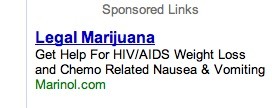
Marinol advertisement on Google
"The use of a standardized extract of Cannabis sativa... evoked a total relief of thermal hyperalgesia, in an experimental model of neuropathic pain,... ameliorating the effect of single cannabinoids," the investigators reported. "Collectively, these findings strongly support the idea that the combination of cannabinoid and non-cannabinoid compounds, as present in extracts, provide significant advantages... compared with pure cannabinoids alone."
Congressional drug warriors like Rep. Mark Souder (R-IN) have long argued that marijuana is not a medicine and that any medicinal compounds in the plant should be isolated or synthesized, as is the case with Marinol, which contains one of the hundreds of cannabinoids found in the plant. The DEA takes a similar approach.
But this latest research only adds to the evidence that that position is mistaken.
back to top
Former State Department official Thomas Schweich, who was the US government's point man in the effort to wipe out the opium and heroin trade in Afghanistan until last month, has accused Afghan President Hamid Karzai of protecting drug traffickers and obstructing anti-drug efforts in an article to be published in the New York Times magazine on Sunday, but which appeared on the newspaper's web site Wednesday night.

opium poppies
"While it is true that Karzai's Taliban enemies finance themselves from the drug trade, so do many of his supporters," Schweich wrote. "Narco-corruption went to the top of the Afghan government," he wrote, adding that drug traffickers were buying off hundreds of police chiefs, judges and other officials. Schweich accused Karzai of resisting heightened anti-drug efforts and opposing the eradication of opium poppy fields, long a dream of US drug warriors.
"Karzai was playing us like a fiddle," Schweich wrote. "The US and its allies would fight the Taliban; Karzai's friends could get rich off the drug trade; he could blame the West for his problems; and in 2009 he would be elected to a new term."
The Karzai government wasn't the only problem, Schweich wrote. He criticized both the US military and NATO forces for indifference, if not outright hostility, toward the anti-drug battle and argued that failing to cut Taliban profits from the drug trade means fighting could continue indefinitely.
"The trouble is that the fighting is unlikely to end as long as the Taliban can finance themselves through drugs -- and as long as the Kabul government is dependent on opium to sustain its own hold on power," he said.
Almost everyone is to blame for the Afghan drug mess, the now-retired drug warrior fumed. "An odd cabal of timorous Europeans, myopic media outlets, corrupt Afghans, blinkered Pentagon officers, politically motivated Democrats and the Taliban were preventing the implementation of an effective counter-drug program," he said.
In a Thursday press conference in Kabul, Karzai rejected Schweich's charges."As I had said two years ago, Afghanistan never takes the blame (for the drugs threat). The Afghan nation due to desperation, war... has been forced to resort to this issue," Karzai replied when asked to respond to Schweich's comments. "Without doubt, some Afghans are drugs smugglers, but majority of them are the international mafia who do not live in Afghanistan," he said.
Afghanistan produces more than 90% of the world's opium. Production has expanded dramatically since the US invaded and overthrew the Taliban in late 2001.
back to top
Despite a global trend toward abolition of the death penalty, a number of countries continue not only to use the ultimate sanction, but to apply it to nonviolent drug offenders. The latest round-up of drug offender executions from the anti-death penalty group Hands Off Cain includes the following:
- Chinese media reported on July 11 that 10 people were executed in central China as "heinous criminals that seriously violated social law and order." Some were executed for murder, some for drug trafficking offenses. It is unclear how many of the 10 were drug offenders.
- China was back at it again last week, when state media reported three members of an international drug trafficking group were executed in east China. They were accused of smuggling drugs into the country. No names were given for the executed Chinese drug offenders.
- The Saudi Arabian official news agency reported Thursday that a convicted Nigerian drug trafficker was beheaded by the sword in Mecca. Shuaib Ali Mohammed had previous drug trafficking convictions and got a death sentence for trafficking cocaine.
Hands Off Cain presented its annual report on the state of the death penalty late this week. Look for an article here next week on how things are looking in 2008 and the state of the movement to end the death penalty for drug offenses.
back to top
Spurred by a favorable court ruling in May allowing Vancouver's safe injection site, Insite, to stay open, health officials in Quebec say they are preparing to open a safe injection site in Montreal in coming months, and there could be many more to follow in the province.

InSite (courtesy Vancouver Coastal Health)
So far, InSite is the only safe injection site in North America, but the idea of creating a network of such sites is already part of Quebec's public health plan. Officials there told the
Canadian Press they are working to establish the Montreal site soon.
"There is a team in Montreal looking at the feasibility and acceptability of all this, but there is no date set yet," said public health director Alain Poirier. "We're working on it at the moment and we hope there will be one soon."
Vancouver's Insite, which was set up as a pilot project five years ago, operated under a limited exemption from Canada's drug laws. With the Conservatives controlling the federal government, Insite's future was precarious, but in May, the British Columbia Supreme Court ruled that Insite is a health facility subject to provincial -- not federal -- regulation and thus constitutionally exempt from federal drug laws. That ruling has cleared the way for other provinces to ponder starting similar facilities.
"It's an interpretation that views injection sites as health services and those are under provincial jurisdiction," Poirier said, referring to the ruling. "We're the ones who pay for the treatments of (addicts), we pay for their care if they contract HIV. It short, it falls under the panoply of preventive services."
But the Conservative federal government continues to oppose safe injection sites. Earlier this month, it announced it would appeal the BC Supreme Court ruling. Health Minister Tony Clement has repeatedly claimed that safe injection sites don't work.
"We don't consider it the best health outcome to keep people in a position where they continue to use the illicit drugs, to inject the illicit drugs," he said in May.
Quebec has already embraced harm reduction strategies to combat the ills of drug abuse. The province boasts nearly 800 needle exchange locations. Poirier said establishing safe injection sites was the logical next step.
"We can't do this in hiding without saying or announcing anything," Poirier said. "The public has to be aware that this is one step more. We'll probably start in Montreal, then look at Quebec City's downtown area," Poirier said. "We haven't ruled out other cities being chosen. We would like to have sites where they are justified by the need."
back to top
The state government of South Australia has made the possession of lights, reflectors, and associated equipment that can be used for growing marijuana a criminal offense punishable by up to two years in prison. Also included in the list of proscribed horticultural items are carbon filters, evaporators, heating tools, stirrers, funnels, and flasks. Under the new statute, people caught in possession of such items will have to prove they have a legitimate reason for having them or face criminal penalties.

grow-op with lights (from usdoj.gov, via Wikimedia)
The move is the latest effort by the state government to crack down on marijuana cultivation there. It also reflects the peculiar Australian obsession with "hydroponic" marijuana, which in the land Down Under is widely considered to be somehow different and more dangerous than marijuana grown by other means.
"These are the tools of the lucrative but deadly drug trade," said state Attorney General Michael Atkinson in remarks reported by Adelaide Now. "They're used in sophisticated set-ups and two-bit backyard operations alike.
This government will prosecute anyone who has these illegal drug-making devices -- unless they can give a good explanation."
Atkinson scoffed at the notion anyone would be using such equipment for anything other than growing pot. "With the amount of hydroponic equipment being sold, you would think South Australia was the hydroponic tomato capital of Australia," he said. "Alas, we do not produce as many hydroponic tomatoes as hydroponic cannabis."
Atkinson said banning such equipment was the best way to attack the drug trade, which he characterized as dominated by biker gangs. "It's no secret that those who have these items aren't planning to bake biscuits for the Girl Guides," he said. The move will "make a big dent" against pot growing, he promised.
back to top
July 29, 1995: In an interview with the editors of the Charlotte Observer, Pat Buchanan says he favors measures that would allow doctors to prescribe marijuana for relief from certain conditions. "If a doctor indicated to his patient that this was the only way to alleviate certain painful symptoms, I would defer to the doctor's judgment," he says.
July 29, 1997: A large number of Los Angeles sheriff's deputies swarm into the home of author and medical marijuana patient Peter McWilliams and well-known medical marijuana activist Todd McCormick, a medical marijuana user and grower who had cancer ten times as a child and suffers from chronic pain as the result of having the vertebrae in his neck fused in childhood surgery. McCormick ultimately serves a five-year sentence, while McWilliams chokes to death on his own vomit in 2000 after being denied medical marijuana by a federal judge.
July 27, 2000: Referring to one of drug czar Barry McCaffrey's tired lines, Salon.com publishes "Fighting 'Cheech and Chong' Medicine," an article showing that the entire genesis of the government's new media campaign, the motivation for making the Partnership for Drug Free America's donated ad time and making it a billion dollars worth of taxpayer funds, was a direct response to the passage of medical marijuana initiatives in California and Arizona in 1996.
July 31, 2000: In Canada, Ontario's top court rules unanimously (3-0) that Canada's law making marijuana possession a crime is unconstitutional because it does not take into account the needs of Canadian medical marijuana patients. The judges allow the current law to remain in effect for another 12 months, to permit Parliament to rewrite it, but says that if the Canadian federal government fails to set up a medical marijuana distribution program by July 31, 2001, all marijuana laws in Canada will be struck down.
July 26, 2001: The British newsmagazine The Economist devotes an entire issue to drug policy, endorsing decriminalization and harm reduction.
July 25, 2002: The Hawaiian Tribune Herald reports: Marijuana eradication in Hawaii contributed to the increase in the use of the drug "ice," according to a three-year study prepared for the National Institute on Drug Abuse. The study's four-page executive summary states, "The use of ice in Honolulu had led to particularly serious physical and psychological problems and significant social disruption in poor working communities where it replaced marijuana, which had become scarce and expensive due to eradication policies... Residents were both pushed away from pakalolo [marijuana], their staple drug of choice, and pulled toward ice by a well organized marketing campaign by Asian distributors." It also notes that violence is more prevalent in the Honolulu meth users.
July 27, 2002: The Associated Press reports that a regional director of Mexico's main intelligence agency was slain in the border city of Tijuana, the 11th person killed over the last week in what authorities say is an escalating drug war.
July 30, 2002: ABC airs John Stossel's special report, "War on Drugs, A War on Ourselves," which critically points out the futility of the government's current approach to drug control policy.
July 26, 2003: The Honolulu Advertiser reports that a Hilo woman who smokes marijuana to treat her glaucoma received a check for $2,000 from her homeowners insurance company for the loss of four plants stolen from her yard. Under a state law passed in 2000, patients with permits who are under a doctor's care may possess up to 3 ounces of marijuana and grow up to seven plants at a time for medical purposes.
July 28, 2003: James Geddes, originally sentenced to 150 years for possession of a small amount of marijuana and paraphernalia and for growing five marijuana plants, is released. Geddes had said, "How can it be that the President, his wife, the Vice President and his wife, the mayor of Washington DC, even the Speaker of the House can do these things, but I must pay dearly?"
July 31, 2003: Karen P. Tandy is confirmed by unanimous consent in the US Senate as Administrator of the Drug Enforcement Administration. Tandy was serving in the Department of Justice (DOJ) as Associate Deputy Attorney General and Director of the Organized Crime Drug Enforcement Task Force. She previously served in DOJ as Chief of Litigation in the Asset Forfeiture Office and Deputy Chief for Narcotics and Dangerous Drugs, and she prosecuted drug, money laundering, and forfeiture cases as an Assistant United States Attorney in the Eastern District of Virginia and in the Western District of Washington.
back to top
Along with our weekly in-depth Chronicle reporting, DRCNet has since late summer also been providing daily content in the way of blogging in the Stop the Drug War Speakeasy -- huge numbers of people have been reading it recently -- as well as Latest News links (upper right-hand corner of most web pages), event listings (lower right-hand corner) and other info. Check out DRCNet every day to stay on top of the drug reform game! Check out the Speakeasy main page at http://stopthedrugwar.org/speakeasy.

prohibition-era beer raid, Washington, DC (Library of Congress)
Since last issue:
Scott Morgan writes: "Needle Exchange Saves Lives. Why Are We Still Arguing About It?," "A Revealing Remark From the Deputy Drug Czar," "The Drug War Doesn't Reduce Drug Use. Drug Users Reduce Drug Use.," "In New Orleans, You Can Get 5 Years in Prison for a Joint of Marijuana," "Police Kill Dog During Drug Raid, Find No Drugs," "Barack Obama Proposes 'Shifting the Model' on the Drug War," "Drug Smugglers Use Hurricane for Cover."
Also featured: "Video Highlights from Vienna Drug Policy NGO Forum."
David Guard posts numerous press releases, action alerts and other organizational announcements in the In the Trenches blog.
Please join us in the Reader Blogs too.
Again, http://stopthedrugwar.org/speakeasy is the online place to stay in the loop for the fight to stop the war on drugs. Thanks for reading, and writing...
back to top
Many of our readers know about the tragic case of Rachel Hoffman, a 23-year-old in Tallahassee, Florida, who was killed by drug dealers after police coerced her into acting as an informant without having access to an attorney. Drug War Chronicle is currently looking for cases, reported or unreported, in which police appear to have committed misconduct or made serious misjudgments in their treatment of informants.
If you can help us find such cases, please email David Borden at [email protected]. We will keep your name and personal information confidential unless you tell us otherwise. If you are uncomfortable sending this information by email, feel free to contact us by phone instead; our office number is (202) 293-8340, and you can speak or leave a message with David Borden or David Guard. Thank you in advance for your help.
Further information on the informant issue, including the Rachel Hoffman case, can be found in our category archive here.
back to top
Do you read Drug War Chronicle? If so, we'd like to hear from you. DRCNet needs two things:
- We are in between newsletter grants, and that makes our need for donations more pressing. Drug War Chronicle is free to read but not to produce! Click here to make a donation by credit card or PayPal, or to print out a form to send in by mail.
- Please send quotes and reports on how you put our flow of information to work, for use in upcoming grant proposals and letters to funders or potential funders. Do you use DRCNet as a source for public speaking? For letters to the editor? Helping you talk to friends or associates about the issue? Research? For your own edification? Have you changed your mind about any aspects of drug policy since subscribing, or inspired you to get involved in the cause? Do you reprint or repost portions of our bulletins on other lists or in other newsletters? Do you have any criticisms or complaints, or suggestions? We want to hear those too. Please send your response -- one or two sentences would be fine; more is great, too -- email [email protected] or reply to a Chronicle email or use our online comment form. Please let us know if we may reprint your comments, and if so, if we may include your name or if you wish to remain anonymous. IMPORTANT: Even if you have given us this kind of feedback before, we could use your updated feedback now too -- we need to hear from you!
Again, please help us keep Drug War Chronicle alive at this important time! Click here to make a donation online, or send your check or money order to: DRCNet, P.O. Box 18402, Washington, DC 20036. Make your check payable to DRCNet Foundation to make a tax-deductible donation for Drug War Chronicle -- remember if you select one of our member premium gifts that will reduce the portion of your donation that is tax-deductible -- or make a non-deductible donation for our lobbying work -- online or check payable to Drug Reform Coordination Network, same address. We can also accept contributions of stock -- email [email protected] for the necessary info.
back to top
Are you a fan of DRCNet, and do you have a web site you'd like to use to spread the word more forcefully than a single link to our site can achieve? We are pleased to announce that DRCNet content syndication feeds are now available. Whether your readers' interest is in-depth reporting as in Drug War Chronicle, the ongoing commentary in our blogs, or info on specific drug war subtopics, we are now able to provide customizable code for you to paste into appropriate spots on your blog or web site to run automatically updating links to DRCNet educational content.
For example, if you're a big fan of Drug War Chronicle and you think your readers would benefit from it, you can have the latest issue's headlines, or a portion of them, automatically show up and refresh when each new issue comes out.
If your site is devoted to marijuana policy, you can run our topical archive, featuring links to every item we post to our site about marijuana -- Chronicle articles, blog posts, event listings, outside news links, more. The same for harm reduction, asset forfeiture, drug trade violence, needle exchange programs, Canada, ballot initiatives, roughly a hundred different topics we are now tracking on an ongoing basis. (Visit the Chronicle main page, right-hand column, to see the complete current list.)
If you're especially into our new Speakeasy blog section, new content coming out every day dealing with all the issues, you can run links to those posts or to subsections of the Speakeasy.
Click here to view a sample of what is available -- please note that the length, the look and other details of how it will appear on your site can be customized to match your needs and preferences.
Please also note that we will be happy to make additional permutations of our content available to you upon request (though we cannot promise immediate fulfillment of such requests as the timing will in many cases depend on the availability of our web site designer). Visit our Site Map page to see what is currently available -- any RSS feed made available there is also available as a javascript feed for your web site (along with the Chronicle feed which is not showing up yet but which you can find on the feeds page linked above). Feel free to try out our automatic feed generator, online here.
Contact us for assistance or to let us know what you are running and where. And thank you in advance for your support.
back to top
RSS feeds are the wave of the future -- and DRCNet now offers them! The latest Drug War Chronicle issue is now available using RSS at http://stopthedrugwar.org/chronicle/feed online.
We have many other RSS feeds available as well, following about a hundred different drug policy subtopics that we began tracking since the relaunch of our web site this summer -- indexing not only Drug War Chronicle articles but also Speakeasy blog posts, event listings, outside news links and more -- and for our daily blog postings and the different subtracks of them. Visit our Site Map page to peruse the full set.
Thank you for tuning in to DRCNet and drug policy reform!
back to top
DRCNet's Reformer's Calendar is a tool you can use to let the world know about your events, and find out what is going on in your area in the issue. This resource used to run in our newsletter each week, but now is available from the right hand column of most of the pages on our web site.
- Visit http://stopthedrugwar.org each day and you'll see a listing of upcoming events in the page's right-hand column with the number of days remaining until the next several events coming up and a link to more.
- Check our new online calendar section at to view all of them by month, week or a range of different views.
- We request and invite you to submit your event listings directly on our web site. Note that our new system allows you to post not only a short description as we currently do, but also the entire text of your announcement.
The Reformer's Calendar publishes events large and small of interest to drug policy reformers around the world. Whether it's a major international conference, a demonstration bringing together people from around the region or a forum at the local college, we want to know so we can let others know, too.
But we need your help to keep the calendar current, so please make sure to contact us and don't assume that we already know about the event or that we'll hear about it from someone else, because that doesn't always happen.
back to top







